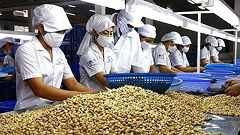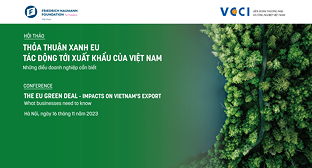Export goods needs to penetrate deeply into niche markets
05/12/2022 10:52

The growth of exports to Vietnam’s key markets is expected to slow down due to pressure from inflation and economic recession. Strengthening trade promotion in traditional markets, and increasing export promotion to new and niche markets is an effective solution to solve difficulties in the future.
According to the Ministry of Industry and Trade, in the first 10 months of 2022, export turnover of goods was estimated at US$312.8 billion, up 15.9% over the same period last year. Although exports to traditional markets recorded growth, Vu Ba Phu, Director of the Trade Promotion Department (Ministry of Industry and Trade), said that in the context that the economy had not fully recovered, growth in key export markets was expected to slow down.
The US was Vietnam’s largest export market in the past 10 months, with an estimated turnover of US$93.4 billion, up 21.7% over the same period last year and accounting for 29.8% of the country’s total export turnover; followed by the Chinese market with an estimated export turnover of US$46.9 billion, up 5.6% over the same period last year.
Export to the EU market was estimated at US$39.4 billion, up 22.3%; to ASEAN was estimated at US$28.9 billion, up 24%; to Korea was estimated at US$20.7 billion, up 15.4%; and exports to Japan were estimated at US$19.8 billion, up 22%.
The representative of the Ministry of Industry and Trade said that in the last months of 2022, high inflation in most countries, which are Vietnam’s major markets, would affect the consumption of non-essential goods, causing a decrease in the demand for imported goods from other countries.
The export market will face a risk of shrinking when the US economy and many countries are at risk of falling into recession, increasing pressure on foreign currency revenue and international balance of payments. This leads to many consequences for economic growth and domestic import-export activities due to the large openness of our economy (more than 200% of GDP).
From the industry perspective, Nguyen Quoc Khanh, Chairman of Handicraft and Wood Industry Association of HCM City (HAWA), said: “Inflation is still increasing in the main export markets, which are the EU countries, along with the impact of the Russia-Ukraine conflict, which makes people in these countries tend to tighten their spending. Demand for non-essential items such as wood products will not increase as strongly as before.”
As export growth to popular markets such as the US and the EU is forecast to slow down, many economic experts believed that it was necessary to strengthen trade promotion in appropriate ways to hit consumer tastes.
For example, for the EU market, Tran Ngoc Quan, Commercial Counselor of Vietnam in Belgium and the EU, said that the EU market was tending to shift strongly to green and clean consumption, which required meeting sustainable development standards in terms of labor and environment. The development of Vietnam's mechanisms and policies needs to keep pace with the EU's trend, especially the trend of green development, reduction of greenhouse gas emissions, and clean energy conversion. Vietnamese enterprises need to have a methodical and long-term business plan with the EU market.
For the US market, Nguyen Manh Hung, Head of Vietnam Trade Promotion Office in New York, said that enterprises needed to exploit the strengths of regional specialties, and competitive advantages, and to meet the diverse needs of customer groups. Additionally, enterprises need to closely cooperate with associations, enterprises, distribution chains, and import focal points; and care about labor, environmental, and social standards.
For the Chinese market, a representative of the Vietnam Trade Office in Nanning (China) proposed that in the context of a limited budget for trade promotion, Vietnam needed to develop a plan focusing on a few industries or groups of products with export strengths to create spillover effect to other groups of goods of the same type. For example, Vietnam should focus on promoting image building for durian and mangosteen because these are two products that China cannot produce.
Promote exploitation of niche markets
Besides traditional export markets, according to Vu Ba Phu: "In the future, to maintain the growth of the economy, especially import and export, trade promotion activities need to be further strengthened, especially in new and niche markets with new suitable products for Vietnam's production capacity.”
Some prospective markets mentioned are Africa, the Middle East, Central Asia, and Latin America. Talking about a potential country in Africa - Ivory Coast, Nguyen Quoc Chinh, in charge of the Vietnam Trade Office in Morocco, said that this is a country in West Africa with a population of nearly 26.5 million people, has a strong consumption power. Meanwhile, the market's product standards are not too strict, and suitable for Vietnamese goods. Vietnamese products are assessed as mid-range products, with a large import demand for many items.
“Although there is a lot of potential and Ivory Coast enterprises are active in looking for trading opportunities with Vietnam, due to the remote location, and no representative of the Vietnam Trade Office in Ivory Coast, the two sides feel risk in payment. Moreover, Ivory Coast’s business culture values face-to-face communication, and they hesitate to work via email. These are the factors to keep in mind in the process of promoting trade with this market,” said Chinh.
Exporting enterprises need to pay special attention to new trade policies in niche markets, new markets. Chinh said that for the Moroccan market, there were a number of tax amendments proposed to be implemented in 2023 such as reducing import tax from 10% to 2.5% for unroasted coffee; and import tax for input products to produce filters for cars.
Assessing the Philippines as a potential market for Vietnamese goods in the future, Phung Van Thanh, in charge of the Vietnam Trade Office in the Philippines, said that the Philippines has been interested in promoting the domestic agricultural industry.
This means that Vietnamese enterprises will face difficulties because Vietnam's exports to the Philippines are mainly agricultural products, and it is necessary to diversify export products to this market.
“Besides, for signed and about to be signed contracts with Philippine partners, Vietnamese enterprises need to verify the ability of the partner to perform the contract to avoid the case of contract failure causing damage to both parties,” said Thanh.
Source: Customs News
Các tin khác
- More efforts needed to maintain export growth to China: Insiders (24/04/2024)
- Shadow trade minister calls for greater focus on removal of Chinese trade barriers (24/04/2024)
- New U.S. Solar Panel Tariff Intensifies Sino-American Green Tech War (24/04/2024)
- It is expected that there are higher orders and revenue in the second quarter from European businesses (24/04/2024)
- U.S. Ceramic Manufacturers Seeking Tariffs Against Indian Import (24/04/2024)
 Home
Home
 About Us
About Us




















